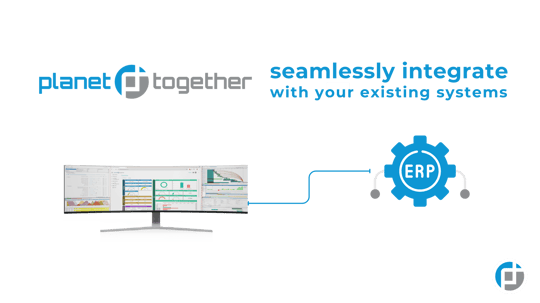
Multi-Plant Planning: Leveraging APS for Global Production Coordination
In industrial manufacturing, the stakes for purchasing managers have never been higher. Globalization, fluctuating demand, tight supply chains, and geopolitical shifts are pushing purchasing teams to rethink how they coordinate production and sourcing across multiple plants. The complexity of managing a network of geographically dispersed facilities requires advanced tools—not spreadsheets or standalone ERP systems, but integrated Advanced Planning and Scheduling (APS) solutions that deliver the agility, visibility, and coordination necessary for success.
In this blog, we explore how purchasing managers in industrial manufacturing can leverage APS, particularly PlanetTogether integrated with leading ERP systems like SAP, Oracle, Microsoft, Kinaxis, or Aveva, to achieve superior global production coordination and optimize multi-plant planning.
The Multi-Plant Challenge for Purchasing Managers
For a purchasing manager overseeing multiple plants, balancing local needs and global efficiency is a daily juggling act.
Some key challenges include:
Material flow synchronization: Ensuring the right materials are at the right plants at the right time, despite differing lead times, local supplier networks, and transportation constraints.
Capacity alignment: Coordinating production capacities across plants to avoid bottlenecks or underutilization, and to make sure the global network operates at optimal throughput.
Cost management: Leveraging global sourcing to achieve cost savings while minimizing risks such as tariffs, currency fluctuations, and regional disruptions.
Supply chain visibility: Maintaining clear, real-time insight into procurement, production, and distribution across all sites.
Responsiveness to change: Quickly adjusting plans in response to demand shifts, supply delays, or unexpected events like equipment failures or geopolitical issues.
While traditional ERP systems offer some multi-plant management capabilities, they often lack the flexibility and scenario-planning power required for advanced coordination. This is where APS comes in.

What is APS and Why Is It Critical for Multi-Plant Coordination?
Advanced Planning and Scheduling (APS) systems are purpose-built to handle complex production and supply networks. Unlike traditional ERP modules, APS systems incorporate real-time data, advanced algorithms, and optimization techniques to:
Align supply and demand across the entire production network
Provide predictive and prescriptive insights for proactive decision-making
Enable scenario simulations to evaluate the impact of changes before implementation
Synchronize production schedules, procurement plans, and inventory strategies
For purchasing managers, APS acts as the nerve center connecting sourcing, production, and logistics across all plants—turning a tangled web of spreadsheets and manual adjustments into a coordinated, agile system.

PlanetTogether APS + ERP Integration: A Powerhouse for Purchasing
PlanetTogether APS, when integrated with leading ERP systems like SAP, Oracle, Microsoft Dynamics, Kinaxis, or Aveva, offers purchasing managers an end-to-end, unified solution.
Here’s how this combination empowers multi-plant planning:
Real-time data synchronization: Integration ensures that master data, transactional data, and live updates flow seamlessly between PlanetTogether APS and the ERP system. Purchasing managers gain up-to-the-minute visibility into material requirements, supplier statuses, and production plans.
Global scenario modeling: Purchasing teams can simulate multiple sourcing and production strategies across plants. For example, what happens if Plant A shifts production to Plant B due to capacity constraints? How will it affect raw material needs, lead times, and transportation costs?
Constraint-based optimization: APS doesn’t just schedule based on static data; it dynamically optimizes plans based on plant capacity, material availability, and supply constraints. Purchasing managers can ensure that procurement decisions align with real-world limitations and opportunities.
Improved supplier coordination: With integrated APS and ERP, purchasing teams can communicate more effectively with suppliers, ensuring they meet evolving demands across different facilities without delays or excess stockpiling.
Enhanced responsiveness: When disruptions occur (e.g., a supplier delay, a sudden spike in demand, or a geopolitical event), PlanetTogether APS enables rapid re-planning across plants, supported by live ERP data, so purchasing managers can act swiftly to mitigate risks.

Practical Benefits for Purchasing Managers
Let’s break down the specific advantages purchasing managers in industrial manufacturing gain from multi-plant APS coordination:
Better negotiation power: Consolidating material requirements across plants provides purchasing managers with greater bargaining leverage. Instead of fragmented orders, they can negotiate volume discounts and favorable terms with global suppliers.
Risk reduction: By visualizing supply dependencies and material flows across the network, purchasing teams can identify single points of failure and diversify sourcing strategies accordingly.
Reduced inventory carrying costs: APS optimizes material flow to prevent overstocking or understocking across plants, minimizing the need for excess safety stock.
Streamlined procurement processes: Integrated planning reduces manual interventions and ad hoc adjustments, freeing purchasing managers to focus on strategic supplier relationships and cost optimization.
Sustainability and ESG alignment: APS enables more precise planning of transportation routes, supplier selection, and production transfers, reducing carbon footprint and supporting corporate sustainability goals.
Best Practices for Purchasing Managers
To fully leverage APS for multi-plant planning, purchasing managers should:
Invest in integration: Ensure PlanetTogether APS is fully connected to your ERP system, whether it’s SAP, Oracle, Microsoft, Kinaxis, or Aveva, to eliminate data silos.
Align cross-functional teams: Work closely with production, logistics, and finance teams to ensure that purchasing strategies support broader business goals.
Use scenario analysis proactively: Don’t wait for disruptions—regularly run “what-if” analyses to test sourcing strategies, evaluate new supplier relationships, and assess potential plant shifts.
Prioritize continuous improvement: Use the insights provided by APS to identify chronic inefficiencies, supplier performance issues, and emerging risks, then build action plans to address them.
Train and empower teams: Ensure purchasing staff understand how to interpret APS insights and act on them confidently.
For purchasing managers in industrial manufacturing, the complexity of multi-plant operations can no longer be managed through intuition and disconnected tools. Advanced Planning and Scheduling, particularly when powered by PlanetTogether and integrated with ERP systems like SAP, Oracle, Microsoft, Kinaxis, or Aveva, provides the coordination, agility, and intelligence needed to succeed in a global production environment.
By adopting APS-driven multi-plant planning, purchasing managers can elevate their role from tactical buyers to strategic orchestrators of global supply chains—delivering value not just in cost savings, but in resilience, efficiency, and competitive advantage.
Are you ready to take your manufacturing operations to the next level? Contact us today to learn more about how PlanetTogether can help you achieve your goals and drive success in your industry.